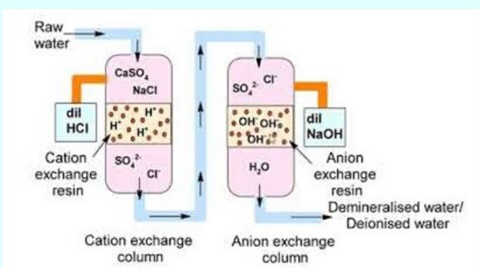What is Demineralization?
Demineralization is a type of water purification. Although it can refer to any water-treatment procedure that eliminates minerals, the term "demineralization" is usually only used to describe ion exchange (IX) procedures that remove nearly all ionic mineral pollutants. Demineralization and deionization are frequently used interchangeably.
Cation and anion exchange resins are both used in IX demineralization, sometimes even in the same column or bed. After demineralization, the treated water will be extremely pure, on par with distilled water, but often at a significantly lower price.

Type of Demineralization Processes:
There are Tw?o Types of Deionization or Demineralization Processes:
1. Two-Bed Demineralization:
As the name implies, this procedure uses two vessels, one containing cation resin and the other containing anion resin. A cation exchanger is the first thing water goes through. Equivalent hydrogen ions are exchanged for each cation. This maintains the electrical equilibrium of the water. An anion exchange is then performed on the water leaving the cation. Here, anions are swapped for hydroxyl ions according to the same principle.
2. Mixed-Bed Demineralization:
The cation and anion resins are combined in a single pressure vessel in place of two separate vessels. This method is unquestionably thought to be more effective than the two-bed plants, but the regeneration process required is trickier in this case. Compared to two-bed plants, mixed-bed plants produce water of greater quality. They are typically utilized, nevertheless, when a higher level of filtration is necessary. Water is further refined using the mixed-bed process after the two-bed demineralization procedure.
A wastewater treatment method called demineralization cleanses water to a degree comparable to that of distilled water. It is a quick procedure that doesn't need scale to accumulate. The demineralization process adheres to a number of principles, including polishing, degasification, and ion exchange.
The ion-exchange method of water filtration is rapid and reversible. And the technology of demineralization is one of the tried-and-true methods for treating water. Depending on the makeup of the water that needs to be treated, different components may be used in different processes.
The technique of demineralizing water is widely used in the domains of textiles, chemicals, boiler feed water, hospitals, swimming pools, the pharmaceutical industry, and the automotive industry.
What is Demineralized Water Used For?
Demineralized water is used in numerous small- and large-scale processes. The following are some of the most widespread applications:
1. Drinking:
The best options for drinking demineralized water are distilled or reverse osmosis water. Water that has been distilled has had its impurities nearly completely eliminated, whereas water that has undergone reverse osmosis processing or filtering has, typically, and depending on the toxins present, had 90% of its contaminants removed. These could include suspended particles, pathogens like bacteria, trace metals and mineral ions, chemicals like chlorine, and chemicals.
Compared to regular tap water, this makes water considerably safer and healthier to consume. However, it's crucial to remember that you might want to think about remineralizing ultra-pure water with beneficial minerals before consumption.
2. Manufacturing:
Cosmetics and other items that need water are not made using regular tap water. It's crucial to utilise pure water because it won't interact with the product's other ingredients or introduce any undesired pollutants. For instance, toothpaste, body lotions, lipsticks, and perfumes are all made with demineralized water.
3. Laboratory Use:
Purified water is used in laboratories as a standard for testing, dilution, and solution preparation.
Instead of using regular tap water, scientists must use purified water because it helps to ensure that the data they collect is reliable, won't leave behind any residue, and helps to maintain the integrity of experiments by limiting the introduction of pollutants or other impurities that can compromise the results.
4. Automotive Purposes:
Demineralized or deionized water is used in the automotive industry for a variety of purposes, including lead-acid batteries, gas turbine engines, and cooling systems. Demineralized water can be more aggressive towards some metals and other materials, therefore professionals need to exercise caution when using it and where.
Conclusion:
Minerals and other water pollutants are eliminated during the production of demineralized water utilising ion-based technologies. Demineralized water can support a wide range of industrial applications and uses, including those in the medical, pharmaceutical, and automotive industries since it is devoid of impurity metals.
Do you need an advice or assistance on selecting the best water and waste water treatment unit? We have solutions for all your problems!
Let us now your problem, our experts will make sure that it goes away.
For an assistance or related query,
Call on +91-965-060-8473
Or write us at enquiry@netsolwater.com



